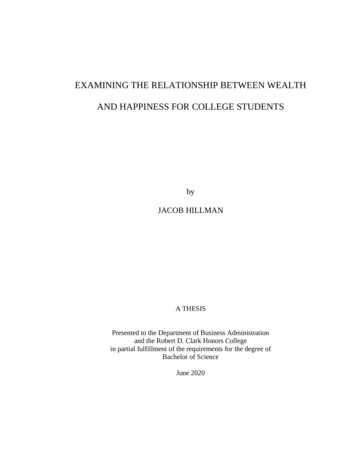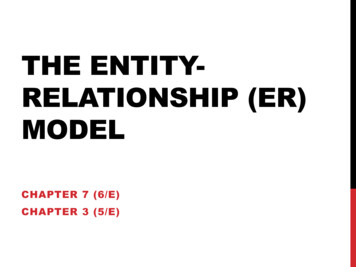
Transcription
EXAMINING THE RELATIONSHIP BETWEEN WEALTHAND HAPPINESS FOR COLLEGE STUDENTSbyJACOB HILLMANA THESISPresented to the Department of Business Administrationand the Robert D. Clark Honors Collegein partial fulfillment of the requirements for the degree ofBachelor of ScienceJune 2020
An Abstract of the Thesis ofJacob Hillman for the degree of Bachelor of Sciencein the Department of Business Administration to be taken June 2020Title: Examining the Relationship Between Wealth and Happiness for CollegeStudentsApproved: Eric Boggs, Ph.D.Primary Thesis AdvisorModern college students are faced with a massive amount of financial stress whilecompleting their time at university. Small wealth events, both expected and unexpected,can have large affects on the happiness of students. This thesis seeks to outline andunderstand the relationship between wealth and happiness for college students. I usedsecondary research to define and explain pertinent societal and interpersonal forces.Additionally, a primary research study I conducted provides first hand explanation forhow wealth events affect students and non-students differently. Overall, a clearer viewof the wealth-happiness relationship for college students is revealed.ii
AcknowledgementsI would like to thank Professor Eric Boggs, Professor Nicole Wilson, andProfessor Michael Moffitt for their support in acting as my thesis committee. Despitethe world being completely turned on its head by a global pandemic, these three made itpossible for me to complete this amazing academic endeavor. I want to thank theUniversity of Oregon and the Clarks Honors College for four amazing years. Eugenewill forever be my home away from home. Four years ago, I decided to give theUniversity of Oregon a chance as more than just the school in my backyard, and I havenever regretted it since.I would like to thank my family for supporting me in this thesis process.Particularly, I would like to thank my mother, Jennifer Hillman, and my grandmother,Susan Ballenger, for helping me to edit this document. Any spelling errors I thereforeblame on them. I would also like to thank two of my best friends, Sean Vermilya andSofia Baldridge, for debating me around the breakfast table and inspiring me to writethe thesis I have.iii
Table of ContentsIntroduction1Why Write This Thesis?1The Hypothesis3Thesis Structure4Secondary Research Analysis and Synthesis5A Working Definition of Happiness and Wealth5Psychological Theories6Age Related Drivers11Instant Gratification13The Increasing Financial Burden of College15Previous Studies around Wealth and Happiness20Primary Research Study26The Purpose for Mixed Method ResearchPrimary Research Methods2627Study Design and Technology Used27Distribution, Population and Anonymity27Self-Report Validity29Survey Sections30Future Corrections of ed Measures ANOVA37Comparing Familial Help41Individual Event Differences: Independent Sample T Tests42Additional Student Versus Non-Student Comparisons43Belief in a Wealth-Happiness Relationship44iv
Discussion45A Comparison of Students Versus Non-Students45Similarities and Differences of Belief47The Importance of Work48Holes in the Data and Future Areas of x 1: Full Description of Participant Demographics56Appendix 2: Descriptive Statistics for all Survey Events59Appendix 3: Main Effect Statistical Importance for Student StatusANOVA60Bibliography61v
List of FiguresFigure 1: Maslow’s Hierarchy of Needs7Figure 2: Tuition and Inflation Comparison16Figure 3: Percentages of Students Working18Figure 4: The Logistic Wealth Happiness Curve25Figure 5: Informed Consent Form29Figure 6: Example Question with Likert Scale31Figure 7: Group Mean Happiness Responses39Figure 8: Pairwise Comparison for Group Means40Figure 9: Group Responses for Familial Help Status42vi
List of TablesTable 1: Mean Happiness Responses for Individual Wealth Events43Table 2: Descriptive Statistics for all Survey Events59vii
IntroductionWhy Write This Thesis?Many people claim that college represents “the best four years of a person’slife.” While this may be an exaggeration, for young adults in the United States, collegerepresents a time of great personal and educational growth. Students develop habits thatcan last them a lifetime. Colleges, themselves, seek to cultivate learning environmentsthat promote creativity, critical thinking, and the open exchange of ideas. Beyondeducational pursuits, students can use college as a time to learn how to live on theirown, build meaningful interpersonal relationships, and set the foundation for asuccessful adult life.In the four years that I have been at the University of Oregon, I have witnessedall of the positive college experiences mentioned above. Yet I have also witnessed theintense amount of stress that can be placed upon college students. Some of this stresscan be result from difficult exams, late night studies, and the natural rigors of a highereducation. However, another major stressor I have personally witnessed, and of which Ihave heard countless stories, is that of financial burden. I have spent nights texting intothe early morning hours with friends wondering how they will pay their next month’srent. I’ve seen individuals struggle to decide whether they can work another shift andforgo their mounds of schoolwork for another day. I know students who have takenterms away from school simply because they could not afford three more months oftuition. For most four-year university students, their time spent at college does not come
without the stress of juggling finances. For many, this stress detracts, distracts, andtakes away from the true mission that colleges strive to create.One morning while I was still in the process of deciding on what I was going towrite my thesis, I had a lively debate with friends around the breakfast table. It centeredaround whether money itself leads to happiness. My argument, in support of therelationship, was inherently simple: in a capitalistic society, money is the necessaryvehicle to achieving one's goals and needs. Doesn’t every person know the joy offinding a five-dollar bill on the ground? That momentary joy, that unexpected moneybrings, cannot be denied. However, my friend brought up great points in rebuttal. Oureducation system preaches learning for the sake of knowledge. Students are taught topursue a degree they are passionate about rather than solely looking at potential salaries.In addition, there are many activities that require little to no financial investment thatcan bring a person joy and happiness. Our debate itself ended that morning, but formyself, the purpose of my thesis was born.The focus of my thesis became to describe and define aspects of this wealthhappiness relationship for college students. In contrast to other wealth-happiness studiesthat I had read in my psychology classes, which focused on annual income levels, Iinstead wanted my thesis to investigate the immediate relationship between personalwealth events and the impacts they have on the happiness and well-being of collegestudents. How does an expected expenditure, like a rent payment, or the unexpectedexpense of an extra book, affect the happiness of a college student immediately after theevent occurs? I also wanted to investigate the social psychological theories and cultural2
forces that could lead to wealth events which affect college students more than thegeneral public.The inherent goal of this thesis is not to win a breakfast table debate. The goal isto educate and inform. My hope is that it can be a resource, both for future collegestudents, and those who are supporting them, either financially or morally. College is ahectic time. In four years, young adults go from dependent high school students toindependent working adults. For many, the stress of these four years makes up more oftheir college experience than their education does. My hope is that this thesis can helpto change that. If college students can understand the financial stress that comes fromeveryday events of school life, and prepare for this stress, it will enable them to take fulladvantage of their time spent at university. For those supporting college students, mygoal is that this thesis will allow them to understand that even though they have livedthrough college, their perception and understanding of the financial stressors faced bytoday’s students may be inaccurate and based off a faulty comparison. If I happen towin a breakfast table debate as well, that is just a bonus.The HypothesisMoving forward, this thesis will center around a central hypothesis. Thishypothesis is that the happiness of college students is more affected by wealth eventsthan the general public predicts and perceives it to be. This hypothesis draws from twocentral tenants. The first is that the happiness of college students, due to multipleinternal and external factors, is more susceptible to being affected by wealth events thanthe happiness of the general public. This tenant is rooted in societal factors, internalpsychological workings, and the evolving college environment, all of which will be3
explained in the secondary research section of this thesis. The second tenant is that thegeneral public underestimates and incorrectly perceives how wealth events affect thehappiness of college students. This inaccurate perception can be directly attributed tothe general public incorrectly understanding today’s college environment, and drawingfrom memories of a university experience that is incredibly different from that of themodern college.Thesis StructureThis thesis will consist of two primary sections. First is a section to synthesizesecondary research around the wealth-happiness relationship for college students. Thissection includes discussions of past psychological theories, behavioral differencesbetween college students and the general population, changes in societal forces, anddifferences in perception. The goal of this section will be to generate reasons for, andsupport, this thesis’s hypothesis. The second section will consist of a primary researchstudy, its results and a discussion of these findings. The goal of this section will be totest empirically this thesis’s hypothesis, and analyze whether the results of the primarysurvey support or refute the hypothesis, and towards what directions of future researchthey point.4
Secondary Research Analysis and SynthesisA Working Definition of Happiness and WealthFor different individuals, happiness can be defined in a variety of ways.Biologists might define happiness by focusing on the release of the reward chemicaldopamine in an individuals’ brain. For the purpose of this thesis and its research,happiness will be examined through a social psychological lens. Distinguished socialpsychologist Sonja Lyubomirsky provided a great working definition of psychology inher 2007 book “The How of Happiness”, defining happiness as “the experience of joy,contentment, or positive well-being, combined with a sense that one’s life is good,meaningful, and worthwhile” (Lyubomirsky, 2007, 32). Moving forwards in this thesis,this definition will serve as an outline for how happiness will be viewed. The choice toview happiness through a social-psychological lens was more appropriate given thenature of the primary research conducted in this work, and enabled the wealthhappiness relationship to be examined alongside other prevalent societal forces inmodern culture.Within Lyubomirsky’s definition lie references to multiple modern andhistorical psychological theories that will be discussed in this paper. Positive well-beingcan be directly found in the first levels of Maslow’s Hierarchy of Needs. A meaningfuland worthwhile life are the goal of Self-Determination Theory and autonomy. All ofthese positive experiences will however be viewed through their interaction withwealth. Many psychological theories view human needs and their fulfillment through anabstract lens. The purpose of the secondary research behind this paper is to examine5
wealth as a vehicle for fulfillment, and subsequently, happiness. Whereas many otherstudies around happiness and wealth examine the correlational relationship between thetwo, this thesis will attempt to define and explain potential drivers behind a directrelationship, and the ways that this direct relationship differs amongst individuals. Forthe sake of clear definition, wealth will be defined for the rest of this thesis as a person’saccrued assets, with a primary focus on immediate wealth (cash, savings and otherfinancial assets). Events focused on the immediate alteration of a person’s wealth willfocus on either expenses that require immediate payments, or influxes of cash thatimmediately increase an individual’s wealth.Psychological TheoriesIntroductionIn this section of the thesis, two psychological theories will be used to explainwhy college students are likely to be more affected by immediate changes in personalwealth. These two theories focus on need fulfillment and personal autonomy, twofactors important to a person’s happiness. While neither of these theories directlyexplains the relation between wealth and happiness as a whole, they do describe driversbehind happiness. By viewing monetary wealth as a force impacting these drivers, it’ssubsequent impact on happiness can be postulated.Maslow’s Hierarchy of NeedsMaslow’s Hierarchy of Needs provides a great basis for insight into what bringshuman beings satisfaction, and what humans actually need to live fulfilled lives. WhileMaslow’s Hierarchy is a bit dated in terms of current Psychological theories, (being6
published in 1943), it does provide a baseline and context for not only the relationshipbetween wealth and happiness, but also many other psychological theories. Thepotential impacts of wealth can be easily seen in relation to the different levels ofMaslow’s hierarchy. Maslow’s hierarchy of needs breaks down human needs into fivedifferent levels, often arranged in a pyramid (See Figure 1). For a person to be able toadvance up the pyramid, and reach for their next “level” of needs, they must first fulfillthose on their current level. Individuals not able to meet their needs are likely toexperience distress, and consequently unhappiness.Figure 1: Maslow’s Hierarchy of NeedsAn article by Saul Mcleod, a Professor of Psychology at the University ofManchester, provides more context on the importance of Maslow’s different levels ofneeds. He describes the first four levels of Maslow’s Hierarchy (Physiological Needs,Safety Needs, Love and Belonging Needs, Esteem Needs) as deficiency needs (Mcleod,2020, 3). Mcleod states that “Deficiency needs arise due to deprivation and are said tomotivate people when they are unmet. In addition, the motivation to fulfill such needswill become stronger the longer the duration they are denied. For example, the longer a7
person goes without food, the more hungry they will become.” Many things weconsider as basic human rights, such as food, water, shelter, and safety, are foundcategorized as deficiency needs. In the context of a capitalist society, all of these requiremoney and wealth to be fulfilled. For college students and other low-income individualswho do not have established savings, immediate changes in their wealth can have largereffects on their ability to meet these deficiency needs.According to Maslow’s hierarchy, only once a person has fulfilled these firstfour levels of needs can they focus on the final level of Maslow’s hierarchy, SelfActualization. Mcleod describes Self Actualization as a Growth Need. These needs “donot stem from a lack of something, but rather from a desire to grow as a person”(Mcleod, 2020, 5). In the context of a college setting, these growth needs could beviewed as a student’s desire to learn and pursue the college education they are payingthousands of dollars a year to access. Students unable to meet their growth needs andcapitalize on the education they are paying for are likely to experience distress andunhappiness.Self Determination TheoryThe belief that self-actualization and personal fulfillment can only be achievedonce more basic needs are met is reflected in a common human motivation theoryknown as Self Determination Theory. Self Determination Theory focuses on three basichuman Psychosocial desires: autonomy, competence, and relatedness (Center for SelfDetermination Theory, 2020). All three of these desires can be seen in the context of thecollegiate environment, but, the former two, autonomy and competence, are especiallyimportant in the world of higher academia. According to Self Determination Theory, the8
desire for autonomy and competence would be the drivers behind students achievingand learning in the higher education.Author Dan Pink focused specifically on the idea of Autonomy in a TED Talkhe gave in 2009. While the talk focuses on motivation in the corporate landscape, theprinciples can be easily translated to the world of education. Pink cites multiple studiesthat support the idea that intrinsic motivation is key to individuals acting with trueautonomy, and that true autonomy is linked to greater production, innovation, andwork-fulfillment (Pink, 2009). Translated to the world of collegiate education, thismeans that true autonomy is key in order for students to capitalize on their education.Yet Dan Pink states that for intrinsic motivation to be met, extrinsic motivatorsmust first be met. Pink directly states that “money must not be issue” in order forworkers to act with true autonomy and reach higher levels of self-actualization. In thecorporate context, the money issue is solved through adequate pay. For college students,this money issue is not so easily resolved. According to Dan Pink and SelfDetermination Theory, college students will be prevented from acting autonomously ifthe financial stressors are not addressed or solved. Without this autonomy, universitystudents will fail to maximize and benefit from their time at college. Whether in abusiness or educational environment, an individual’s life is significantly impacted whenmonetary issues represent a basic, deficiency need.Inferring the Impact of WealthWhat Maslow’s Hierarchy of Need and Self Determination Theory do nothighlight, and miss within the aforementioned context of a capitalist culture, is thatwealth and money are the underlying vehicle that facilitates the satisfaction of most9
deficiency needs. Money allows individuals to eat, drink, and sleep with a roof overtheir head. The satisfaction of these needs is what enables individuals to feel happiness.A student unable to make rent, or pay for groceries, will be unable to satisfy their basicdeficiency needs. Unhappiness will spawn directly from this lack of satisfaction. On topof this, these students will also be unable to satisfy their growth needs, and will not beable to pursue the self-fulfilling education that many collegiate universities stand topromote. According to Self Determination Theory and Dan Pinks, if money IS an issue,then students will not be able to generate internal motivation or act with autonomy.Their education and self-actualization will likely go unachieved, and more unhappinesswill spawn from this reality.SummaryThe two above theories provide a framework for how wealth can impact thedrivers behind happiness in the context of a college environment. While all individualsare subject to the need fulfillment underlying both theories, there are specific forces andevents faced by college students that cause their happiness to be more extremelyimpacted by immediate changes in personal wealth. These forces are both internal,characterized by behavioral differences amongst college students, and societal, drivenby changes in culture and the cost of college. Subsequent sections of this thesis willhighlight specific examples of these forces.10
Age Related DriversLack of Financial EducationIn examining the wealth happiness relationship amongst college students, thebehavioral tendencies of young adults must be examined closely. For many collegestudents, university represents their first experience living away from parents andguardians, supporting themselves financially, and being in full control of their scheduleand activities. According to a study conducted by ING Direct, the largest direct bank inthe United States, over 83% of teens “admit they don’t know much about personalfinance” (Tuggle, 2012). These late teens and those in their early twenties, living ontheir own at college, are often forced to make financial decisions from an uninformedand unexperienced point of view. These decisions, if incorrect, can further amplify thenegative effects that wealth can have on their happiness.Impulsivity and Conspicuous SpendingIn direct relation to a culture of instant gratification (which will be discussedlater), young adults are also the most likely to make impulsive decisions in pursuit ofshort-term gratification. According to a 2015 study conducted by four EuropeanProfessors of Psychology, impulsive individuals are far more likely to take short termpayoffs, regardless of whether they are presented with options for larger payoffs at alater time (Bialaszek, 2015). For college students, these impulsive decisions come withreal world financial ramifications, often for the first time in their lives.In addition to being impulsive, college students are more likely to spendconspicuously in order to satisfy their need for in-group affirmation. Conspicuous11
spending is defined as non-essential spending, usually in-place-of, or superseding,essential expenses. According to a 2008 study conducted at the University of Otago,young adults were more likely to conspicuously spend, with “non‐essentialconsumption seen as ‘deserved’ and a ‘reward’ for behavior such as studying orworking” (Penman, 2008, Para. 3). Furthermore, the study’s results indicated that“Social pressure is found to be the key driver of consumption choices in this group, withthe majority of spending decisions made impulsively” (Penman, 2008, Para. 4). Collegestudents are more likely to purchase the shirt all their friends have or spend outside theirbudget to go to a concert that all their friends will be attending. Conspicuous spendingcan be explained by re-examining Maslow’s hierarchy. One of the deficiency needsoutlined by Maslow was the need for belonging. For college students, this meansapproval from their peers. College students feel pressure to behave and consume in thesame ways as their peers in order to receive this approval, whether it is large purchases,like clothing or events, or even smaller purchases, like drinks at the same bars.Conspicuous spending can be directly linked to a need for belongingness and externalaffirmation.SummaryFor many College students, their time spent at college represents their first timeliving on their own, and most students are living without proper financial education.This lack of financial knowledge, combined with tendencies to be impulsive and spendirrationally and intense peer pressures to meet in-group habits and behaviors, can leadmany college students into precarious financial situations. Combined with the fact thatthese college students are unlikely to have accumulated savings in the first place, and12
many of these individuals may find themselves struggling to make the necessarypayments to promote their wellbeing. Expenditures and cash savings, whether expectedor not, can be forecasted as having larger emotional impacts, pointing to a more volatilerelationship between wealth and happiness for college students.Instant GratificationClosely related to the concepts of impulsivity and maturity, instant gratificationcan be viewed as a behavioral driver behind the actions of college students that exposethem to increased financial risk. While impulsivity can be linked to the younger age ofcollege students, instant gratification is a larger cultural force that has arisen along-sideadvancement and usage increases in mobile and computer technology and informationavailability.Information AvailabilityThe increasing prevalence of a culture of instant gratification can be cited ashaving an effect on the relationship between wealth and happiness for youngergenerations. Social media, instant messaging, in addition to online grading and ecommerce have all vastly affected the process and rate at which younger generationscommunicate and receive information. College age individuals can view gradesimmediately after exams, receive paycheck deposits directly into their bank account,and make online purchases with the click of a button. These changes have changed thefocus for many young people entirely towards the short term, instant results orfeedback. Paying for a concert ticket or shirt in the short term may be prioritized overensuring enough money is saved for next month’s rent. Student loan debt recently13
topped 1.41 trillion, an increase of almost 120% over the last 10 years (Fields, 2019).In a world where college costs more than ever, not being able to focus on longer termexpenses can be critically harmful to a college student’s well-being.Balancing Instant Gratification and PatienceAvner Ofner, an economics professor and historian at Oxford University,alternatively cites the importance of avoiding instant gratification in the pursuit ofhappiness. In his book, The Challenge of Affluence, Ofner states, “Well-being .requires a sustainable balance between the present and the future This also requires apersonal capacity for commitment. Call this capacity prudence” (Ofner 2006, 3). In aculture that has become increasingly focused on short term goals and instantgratification, prudence and commitment have been stressed less and less to youngergenerations. Author and Lecturer Richard Reeves confirmed this, and wrote that “The"commitment strategies" required to balance immediate pleasures with the sacrificesnecessary for lifelong well-being are harder to form in an era of constant novelty”(Reeves 2006). Not learning these commitment strategies and having them underminedby modern culture and technology has left many members of the younger generationswith short minded viewpoints.According to Ofner’s assertions, well-being, a primary aspect of happiness, isonly achieved through a balance of the present and future. When examining a group ofindividuals like college students, who have been previously described in this thesis ashaving actions and focuses aimed towards short term pleasures, a clear imbalance canbe seen. According to Ofner, this imbalance would likely decrease well-being, andsubsequently decrease happiness. When paired with other forces outlined in this thesis,14
including a lack of financial education and monetary security, the tendency of collegestudents to focus on instant gratification can be attributed as a driver behind theirhappiness’s susceptibility to fluctuations in personal wealth.Summary and Practical ExpressionIn the terms of this thesis and its primary study, this focus upon instantgratification would be reflected by college students being more affected by immediatewealth increases and decreases. Long term promises of wealth may feature as secondfiddle to immediate influxes. College students would likely view the outflow of moneyfor a necessity, such as rent, as being an immediate downfall, whereas older generationsmay instead process the payment as a promise of safe shelter for the next month. Theprimary research survey of this thesis has been specifically designed to examineimmediate reactions to wealth related events, and to compare those reactions directlybetween individuals currently enrolled in higher education and those out of college.The Increasing Financial Burden of CollegeIntroductionThe previous two sections of this thesis have primarily focused on internalpsychological drivers and behavioral characteristics that could lead college students tobe more affected by immediate wealth changes. However, in application, these internaldrivers directly interact with the increasing financial cost of college. This section willexamine the increasing cost of college, and how it affects both college students, and theperceptions of non-college students.15
The Rising Cost of TuitionInTuition Comparison to US Inflationorder to 14,000.00accurately 12,000.00 10,000.00understand 8,000.00the stress 6,000.00 4,000.00that 2,000.00 0.001976monetary1980198519901995UO Tuition and Fees200020052010Value of 1976 Tuition20152020relatedevents placeupon current college students, one must first understand the escalating cost of collegeitself. This cost, as it has increased over time, has placed more and more stress oncollege students, and their families. To use the University of Oregon as an example, theannual tuition and fees for an in-state student in 1976 was 714 (University of OregonRegistrar, 2014). In 2020, forty-four years later, this same number came in at 12,720, an increase of 1866% (College Tuition Compare, 2020). College is not asaffordable to young adults in 2020 as it was almost 50 years ago, when many parentsand grandparents of current college students were achieving their college degrees.Figure 2 provides a comparison between the rising cost of tuition and the value of thedollar according to inflation.Figure 2: Tuition and Inflation ComparisonIn 1976, a student could work 40 hours a week for 3 summer months, at theOregon minimum wage of 2.30 per hour, and easily make the money necessary to pay16
for the next year's tuition (The Oregonian, 2014). In 2020, a student would have to work40 hours a week at minimum wage for 28 weeks in order to solely meet the cost oftuition and fees for the next scholastic year. Additionally, all of these pertain solely toan in-state, public insti
Moving forward, this thesis will center around a central hypothesis. This hypothesis is that the happiness of college students is more affected by wealth events than the general public predicts and perceives it to be. This hypothesis draws from two central tenants. The first is that the happiness of college students, due to multiple










